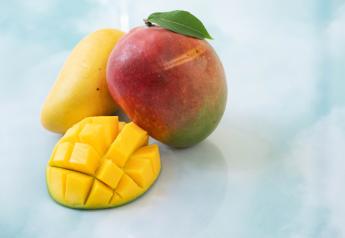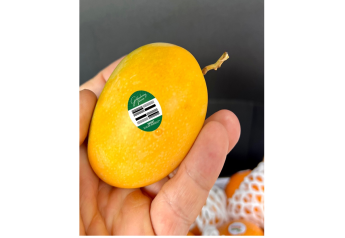Podcast, video, story: Where vertical farms (like Bowery) are headed
Tip of the Iceberg — The next steps for CEA, says Bowery Farming's Katie Seawell
Food is one of the common threads in almost every major issue in the world today.
And controlled-environment agriculture, usually called CEA, is one solution to food-supply, food-safety and supply-chain challenges, proponents say.
These companies were growing fast before 2020 — especially after the FDA excluded this subsection of the industry from nationwide romaine recalls in 2018 — but then kicked into overdrive during the first year or so of the COVID-19 pandemic, when the economy and logistics took a turn. Most of these high-tech companies grow produce near the end consumer, improving traceability and reducing supply chain challenges.
One popular form of CEA is indoor vertical farming, in which the produce rows are stacked on top of each other, all the way up to the ceiling of the growing warehouse.
Listed to this interview with Katie Seawell, chief commercial officer of indoor vertical grower Bowery Farming, based in New York City.
Major CEA steps
These CEA companies have been formally and informally discussing setting CEA-specific food safety and industry standards, possibly third-party certification, for at least the last four years.
The CEA Food Safety Coalition formed in 2019, after the 2018 romaine recalls, to advocate for the indoor leafy greens industry. By the summer of 2021, the coalition had established its first food safety standards.
“The coalition is broadening its scope to define for retailers and shoppers what CEA is, how you find it, what it means,” Seawell said. “They want to set standards for it, look into third-party verification and certification.”
By August 2022, Tom Stenzel, formerly president and CEO of United Fresh Produce Association, was named executive director of the coalition.
And then 20 vertical farming companies signed — on Sept. 20 — the first Vertical Farming Identity Statement and Industry Manifesto at the Vertical Farming World Congress in Brussels, according to a news release from Bowery Farming, based in New York City.
Signing companies include: 80 Acres, AeroFarms, Bowery Farming, Crop One, CubicFarms, Elevate Farms, Fifth Season, Fischer Farms, Freight Farms, Infarm, Infinite Acres, Jones Food Company, Kalera, La Grangette, Ljusgårda, N.THING, Plenty, Stacked Farm, Urban Crop Solutions, Urban Harvest, Vertical Future, YesHealth Group and ZipGrow.
These companies are trying to set standards by aligning with globally accepted impact frameworks, for example, the Science Based Targets initiative, Certified B Corp, or the United Nations Sustainable Development Goals.
About Bowery
Founded in 2015, Bowery Farming grows leafy greens, herbs and strawberries using hydroponics. The business model involves growing in refurbished warehouses close to the communities it serves.
Bowery’s operating system manages the workflow of the high-density farm, which involves seeding, germination, growing, processing, packing and shipping, Seawell said. The system tells the farmer which task to do when, to maximize production and freshness.
The system also controls all the inputs for the plants’ growth and health with integrated sensors, vision systems, automation to give the plants what they need when they need it.
The system uses a lot less water and land than in traditional farming, she said. Lettuces have a 25-30-day growth cycle.
“Light intensity and duration actually have a profound impact on the flavor profile,” Seawell said. And “because we’re close to the point of consumption, we’re getting from harvest to shelf in less than 48 hours.”
Watch: The video interview with Bowery Farming
Besides headquarters in New York, Bowery has three commercial farms: Kearny, N.J.; Nottingham, Md.; and Bethlehem, Pa.
Plans are underway to open another commercial farm in Arlington, Texas, and Locust Grove, Ga., she said.
The company has 13 different lettuces and herbs available commercially.
“We want to create a new gold standard in produce, not just leafy greens,” she said. “Fruiting crops is the next big category we want to tackle.”
In early spring, Bowery had a limited release of strawberries in the New York market. It was a duo-pack: of wild strawberries and a garden strawberries.
“Part of the mission at Bowery is to open the aperture for consumers on how many different varieties and flavors there are, not only in lettuce and herbs,” she said.
Strawberries work because people really notice the flavor nuances, and it has a cleaner finish when grown indoors without pesticides.
Nike of produce
“Food is so emotional. It’s got cultural relevance, it’s got social relevance, it’s got health components to it — yet the produce category, broadly speaking, doesn’t have a lot of brands in it. There has not yet been a Nike of produce, or what Starbucks is to coffee. That has not existed yet,” Seawell said. “And that is part of the mission here at Bowery: To build a generational brand in produce with consumers that connects with them on an emotional level.”
The goal is to scale up to the point to be competitive with traditionally grown produce.
Bowery plays in the premium space with the duo-pack of strawberries and its limited-release Farmer Selections lettuces to create social currency, Seawell said.
But there’s the other end too:
“A really big part of what we’re doing at Bowery is democratizing access to fresh food. It’s both,” she said.
To have transform the fresh food system, Bowery wants to scale and broaden the access and is working on that in three ways:
- Donations to the communities surrounding the farms.
- Working with nonprofit partners to drive more access, such as DC Central Kitchen, including the Healthy Corners program, where the same Bowery clamshells are sold at a price point appropriate for that community.
- Bowery products have penetrated the three major retail channels: natural, independent retailers; conventional retailers; and mass retailers such as Walmart.
Unsurprisingly, an omnichannel strategy involving e-commerce plays a big role too, for Bowery. The company, and CEA produce as a whole, reaps three key benefits from e-commerce, Seawell said:
- “Consistency of our product and shelf life plays very well on e-commerce because there is less variability. There are no surprises,” she said.
- It’s another great place to tell the company story.
- The earliest adopters of the CEA space are a slightly younger demographic, who not only care about experimenting with flavor profiles and sustainability, but also shop online a lot.
“Younger generations are interested in technology’s intersection with serving the greater good, especially with food,” Seawell said.
Learn more: Listen to the interview on the "Tip of the Iceberg" podcast.







